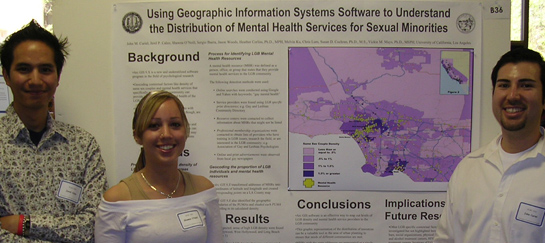Sexual Minority Mental Health

Americans face different mental health needs across their lifespans depending on a range of factors that include race, ethnicity, socioeconomic status and sexual orientation. For decades, clinicians and researchers have struggled with the lack of data for lesbian, gay, bisexual and transgender (LGBT) populations in general, and for those who also belong to racial and ethnic minority groups in particular, in order to design programs that meet their mental and emotional health needs. In response to the recent Institute of Medicine report on the health of LGBT Americans, the U.S. Department of Health and Human Services released an action plan that focuses on building a better evidence base through research and the development of better policies to address LGBT health and mental health needs.
The BRITE Center designs research studies that gather data on lesbian, gay and bisexual populations. Data on these populations is critical to understanding the factors that affect their health. Data also helps drive the policy changes necessary to address some of those primary factors, including stigmatization and discrimination.
Related Links
• The Effects of Unequal Access to Health Insurance for Same-Sex Couples in California (Health Affairs)
• Influence of Gender, Sexual Orientation and Need on Treatment Utilization for Substance Use and Mental Disorders: Findings from the California Quality of Life Survey (BMC Psychiatry)
• Institute of Medicine Report Brief – The Health of Lesbian, Gay, Bisexual, and Transgender People: Building a Foundation for Better Understanding
• Report Brief – Using Data to Build Better Programs and Drive Better Policy for Lesbian, Gay and Bisexual Communities (coming 2012)
Past Project Highlights
BLACK C.A.R.E.
The BRITE Center’s Black C.A.R.E. (Black Community AIDS Research and Education) project worked on education, research, advocacy and health care policy development in the Black community from 1987 through 2004. Through Black C.A.R.E.’s Keeping Young Men Healthy project, the BRITE Center focused on helping to reduce the rate of new HIV infections in young African American men. The center explored preventive mental health interventions and highlighted the fact that widespread disparities in education, employment and culture result in distinctly different prevention needs within this population.
Based on its research, the Center made a series of recommendations for changing the federal research agenda to focus on data that researchers and health systems need to better serve African American men who have sex with men, including the various sub-groups of that population.
Related Links
• Waging a war for the lives of African American gay men and men who have sex with men: A prevention agenda in the twenty-fifth year of the HIV/AIDS epidemic (The Scarlett Letters)
• HIV prevention research: Are we meeting the needs of African American men who have sex with men? ( Journal of Black Psychology)
• Associations of Race/Ethnicity with HIV Prevalence and HIV-Related Behaviors Among Young Men Who Have Sex With Men in 7 Urban Centers in the United States (Journal of Acquired Immune Deficiency Syndromes)
• BLACK C.A.R.E. Project Website
Learn more
WHISPERS
In the past, few scientific research studies looked at the health needs of lesbians, and even fewer focused on women of color or lesbian or bisexual women over 40. The BRITE Center’s Women’s Health Interview Survey Project for Education, Research and Services (WHISPERS) sought to bridge that research gap by designing an innovative outreach strategy to create a data cohort of some of the hardest to reach populations – lesbian and bisexual women of color and young women aged 18-24 – so that their needs could be better represented in health and prevention programs. The study also included outreach to lesbian and bisexual women over 65 in order to capture the needs of these populations across the lifespan.
Through this project, the BRITE Center was able to advance the field of research for these women, as well as make policy recommendations about how to better serve a portion of the population that had been hidden from research and policy and program design.
Related Links
• Depressive Distress and Prevalence of Common Problems Among Homosexually Active African American Women in the United States (Journal of Psychology and Human Sexuality)
• Heterogeneity of health disparities among African American, Hispanic, and Asian American Women: Unrecognized influences of sexual orientation (American Journal of Public Health)
• WHISPERS project website
Learn more